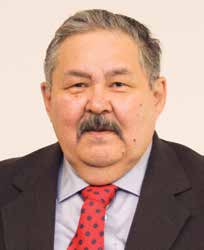Op-Ed: COVID-19 Highlights Lack of Basic Infrastructure in Rural Alaska
Lack of Infrastructure Limits Results of Best Practices
By Robert Beans, Board Chair, and Andrew Guy, President/CEO
March 20, 2020

(Anchorage, Alaska) – Calista Corporation appreciates the leadership of elected officials, health experts and many others that have guided Alaska and the nation through the novel coronavirus pandemic. However, many of the guidelines to minimize transmission and to “flatten the curve” are difficult, if not impossible, to implement across rural Alaska. For those unfamiliar with remote Alaska, we want to illustrate some of the challenges rural families are currently facing and hope that together we can find solutions.
Since the days far before Statehood, Alaska Native people thrived on our traditional homelands, in one of the harshest environments known to man. We are survivors. But today’s world is much different than days past. A cash economy and high-speed internet has changed the way we live, work, and socialize. While many rural Alaskans enjoy the advantages of urban living, it is easy to see in an emergency, like the one we currently and collectively face, those privileges, sometimes life-saving, do not benefit Alaskans and rural Americans equitably.

Urban centers across our great nation have enjoyed and benefitted from extensive infrastructure development for decades, greatly increasing the quality of life for millions of people. American tax dollars have contributed to access and use of clean water, ease of transportation, improved safety, and much more. While we are all seen as equal under the law, citizens in rural Alaska are treated differently and have not received the same benefits of taxes paid. While it is challenging to provide equitable benefits across an area as vast as Alaska, as Americans we expect to have infrastructure for our basic health needs.
At breakneck speed, due to COVID-19, the world is again changing before our eyes. UN experts warn that close to three billion people worldwide, mainly in developing nations, lack basic infrastructure like running water to protect people. Yet, right here in America, there are dozens of Alaskan communities included in that group of people without basic sanitation. Focus on that for just a moment: Alaskan communities … American citizens … without basic running water and sanitation. Alaska is long overdue for systemic and transformational change. It is time for us to come together as a state and as a nation, urban and rural, to ensure our most vulnerable populations of Americans benefit from the same basic infrastructure and protections guaranteed to urban centers.
Federal and state governments have issued preventative methods and actions that should be strictly followed to prevent the spread of COVID-19. Much of the mandated guidance are things most people easily take for granted such as social distancing, washing hands, staying home when sick, cleaning and disinfecting. However, such simple mandates pose serious challenges for rural Alaskans. Schools and businesses across the country have closed and online learning, shopping, and working are being promoted as the replacement for in-person interaction; a virtual reality that is virtually non-existent in remote communities.
Social distancing and staying home is challenging at best in rural Alaska due to limited and overcrowded housing. Multiple generations often live in small, poorly ventilated homes with mold, and it is not uncommon for multiple children to share the same small room; often, the same bed. Combined with a lack of potable water, disease can quickly explode in a small, crowded environment where the ability to simply wash hands in clean water poses an obstacle. Frigid winters cause pipes to freeze and entire communities are often left dry. Access to clean water alone is directly correlated to health, safety, and quality of life.
The Alaska Department of Environmental Conservation’s (DEC, dec.alaska.gov) most recent July 2017 report shows more than 30 communities “where 45% or more homes have not been served either via pipe, septic tank and well, or covered haul system.” More than 1 in 3 of these communities are in the Yukon-Kuskokwim Delta. Further, the DEC’s Clean Water Challenge cites three studies and the impact of water. For example, one featured study found the lack of access to piped water caused “higher rates of invasive pneumococcal disease among Alaskan children” (Wenger).
Cleaning and disinfecting supplies are also not readily available in areas where all goods are delivered by plane or barge. In Alaska, 82 percent of communities are off the road system (Alaska Dept. of Transportation, Fast Facts). This lack of access to transportation has a direct impact on access to health care, options for food and supplies, and results in astronomical energy costs. Not only are things like toilet paper, diapers, and cleaning supplies expensive because they must be flown to communities, they are limited in supply.
School closures and online learning also remain a challenge despite GCI’s achievements in providing land-based cellular service in rural Alaska. However, technology has advanced exponentially since GCI launched the TERRA project in 2011. At that time cellular 3G technology was common and maximum speeds were about 2Mbit/s. Currently, the FCC defines broadband as speeds of 25Mbps download and 3Mbps upload. (About 100 times faster download and 12 times faster upload compared to 3G speeds.)
The cost of 6Mbps download residential service with a 40GB monthly data cap in Bethel is $165/month and in Kotzebue $150/month. In Dillingham the cost is $165/month for 6Mbps download and 100GB data cap. This makes it cost-prohibitive for the average family in rural Alaska to purchase high-speed Internet. That can leave 82 percent of Alaskan communities without an affordable option to provide distance education to children or the option to telework. The Calista region is also one of the economically poorest in the nation and many families do not own a home computer.
You might ask, why is Calista involved in this discussion? As an Alaska Native Corporation, rather than a Tribal government, we are committed to honoring the mandate given to us under the Alaska Native Claims Settlement Act (ANCSA), to provide and promote financial and socio-economic benefits to our shareholders. The specific word that is used in ANCSA, “promote,” is key when read together with Section 1601(c):
…no provision of this chapter shall replace or diminish any right, privilege, or obligation of Natives as citizens of the United States or of Alaska, or relieve, replace, or diminish any obligation of the United States or of the State or Alaska to protect and promote the rights or welfare of Natives as citizens of the United States or of Alaska (emphasis added).
These 61 words make it clear and inarguable: ANCs provide benefits that include monetary distributions, internships, hiring preferences, and to promote the social and economic well-being of shareholders through advocacy and awareness. Although, the duty to protect and promote the welfare of Natives as citizens, including providing effective infrastructure, are inherent functions of Tribal, state, and federal governments. In times like these, we support our Tribal governments by helping to bring awareness to issues of equality and urge the federal government to honor its trust responsibility and obligations to Tribes, especially in times of national crisis.
We understand that rural Alaska infrastructure challenges won’t be solved anytime soon. However, the Trans-Alaska Pipeline was completed in less than six years, we set foot on the moon in just over eight years, and we saw 2018 earthquake damaged roads repaired in just days. Adhering to well-established environmental protections and utilizing Alaskan ingenuity, rural infrastructure, including water, broadband connectivity, and more could be completed in a similar timeframe. The United States and the State of Alaska have the capacity and resources to provide the needed infrastructure to rural Alaska. All that is lacking is the political will and an acknowledgement of the urgency of the need. Let’s come together now as an Alaskan community to create a safe environment for all.
Our Elders have long warned that we would one day return to simpler times. Alaska was on the front lines of the Spanish-flu 100 years ago. In 1918, the smallest, mainly Native communities of our state, were decimated. That same year, the salmon run collapsed. Per capita, Alaska lost more people to the pandemic than any place in America. Elderly people are the highest at-risk population to succumb to COVID-19. Our Elders are our culture bearers. Through language and cultural practice, our Elders hold the key to the past, present, and future. Alaska Native people and all Alaska residents should be united in demanding change for our future generations, so we do not open the scars of the last pandemic. Let’s be good neighbors and together demand that history not repeat itself at the expense of our small Alaskan family.
This pandemic is an urgent reminder to state and federal governments to fulfill obligations to U.S. citizens in rural areas. Residents of rural Alaska, fellow citizens and voters, Alaska deserves a program akin to the Works Progress Act. More than 40 years and 17 billion barrels of oil after ANCSA was signed into law, it is well past time for clear and specific action by our elected officials. When you vote in the next election, please keep the people of rural Alaska in mind and help us craft solutions to the challenges we face as a state and as a nation. God bless us all.
Calista Corporation
Robert Beans, Chair
Andrew Guy, President/CEO
###
Andrew Guy is the President/CEO of Calista Corporation. Calista has over 32,000 Shareholders and is the parent company of more than 30 subsidiaries in the following industries: military defense contracting, construction, real estate, environmental and natural resource development, marine transportation, oil field services and heavy equipment sales, service and rentals. Since 1994, Calista has provided more than $4.8 million in scholarships to its Shareholders and Descendants. Since inception, Calista has declared more than $67.7 million in dividends and distributions, and $6.5 million in Elders’ Benefit Program distributions to Shareholders. Calista can be found on Facebook (www.facebook.com/CalistaCorporation) and Twitter (http://twitter.com/CalistaCorp).